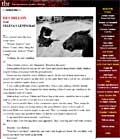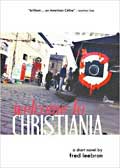![]()
 Yelena’s Leningrad
Yelena’s Leningrad
by Des Dillon
Seanchaidh Publishing, 2015
Scottish author Des Dillon, who has written so movingly of his native country, turns here to Russia and the siege of Leningrad; i.e., the prolonged military blockade undertaken mainly by the German Army Group North against the city of Leningrad, which began in 1941 and lasted for two and a half years. This siege caused the greatest destruction and the largest loss of life ever known in a modern city, resulting in the deaths of up to 1,500,000 soldiers and civilians and the evacuation of 1,400,000 more, mainly women and children, many of whom died during evacuation due to starvation and bombardment.
In this, Dillon’s seventh novel, we follow the siege through the eyes of twenty-seven-year-old Yelena, a single mother with a baby girl, who lives communally with her sister, Stasia, her sister’s husband Viktor, and their twelve-year-old son Aleksei, among others. At first Yelena says she felt that the war would never reach her. Then news of skirmishes began in the newspapers and radio broadcasts, and later “it became distant lights in the sky on a warm June night, then the thuds of far-away bombs, and the crash of buildings on the outskirts, the air raid alarms and whistling shells.” And before long the bombing comes straight to them and destroys their home. Worse than this was Hitler’s plan to starve the city, which he effectively did. With Leningrad surrounded and supplies cut off, the population slowly begins to die of hunger. Yelena boils leather belts to make a kind of broth. People grow so thin they are unrecognizable and begin to drop dead everywhere.
Yelena’s brother-in-law, Viktor, fights at the front and reports back home when he can. Not much progress is made, but eventually a road to the city is forged, The Road of Life, and trucks begin driving over thick ice—sometimes not thick enough—to get food to the city. His son Aleksei is among the young Pioneers, who scurry about doing what they can, but are under the influence of The Party who urge them to report on family members who speak against the regime.
At one point, Yelena loses her baby girl to a gang of marauders. In trying to track them down, she and Aleksei discover a horror that according to record was a reality: acts of cannibalism. This theme runs in the background throughout much of the novel and culminates in a shocking disclosure, adding horror to horror.
If this misery sounds too depressing to venture into, take heart. For also running throughout the novel is a saving grace: music. Yelena is a violinist in the Leningrad Radio Orchestra and this magnificent orchestra rehearsed and played publicly for all but a short period during the siege. Even when the musicians could hardly sit upright or gather the air needed for the wind instruments, they persevered, led by a valiant conductor. During the darkest hours, Yelena takes up her violin and plays (as her sister takes up her art and paints). Their music is broadcast, even to the front when possible. And the Germans hear too, some claiming that they were moved to tears. Composer Dmitri Shostakovich composed Symphony No. 7 Leningrad during this time, and on Aug. 9, 1942 it was performed by the Leningrad Radio Orchestra, broadcast internationally.
As Yelena’s personal story unfolds, we are reminded again and again of the healing powers of art and how it can sustain us during the very worst of times. We are also reminded that no one can safely say what they will or will not do while starving to death during a record-breaking bitter cold winter.
This is a novel of extremes, which is the only way to capture the essence of the time. Some lose all sense of humanity and succumb to the unthinkable; others transcend the experience and offer hope to all. It is a testament to Des Dillon that he captures the entire panorama so vividly. And Scotland even enters into the picture in its way near the end, specifically Dillon’s hometown of Coatsbridge, reminding us of how we are all bound together in this great big spinning world. Read this novel for its heartbreaking, real-life history and read it to savor the redemption that followed. J.A.
 See excerpt from
See excerpt from
Yelena’s Leningrad from TBR issue 86
![]()
 Welcome To Christiania
Welcome To Christiania
by Fred Leebron
Outpost19, 2016
For those who may not know, Christiania is a self-proclaimed autonomous neighborhood of about 900 residents, covering 84 acres in the borough of Christianshavn in the Danish capital Copenhagen. Civic authorities in Copenhagen regard Christiania as a large commune, though the supervision of the area, by special law, is not covered by the city but rather by the state. Apart from the thousands of tourists who pass through, to gawk and perhaps buy pot, it attracts an array of colorful bohos and misfits who have opted to drop out of conventional society. This unique space forms the backdrop of Fred Leebron’s fourth novel in which an unnamed male narrator loses no time in setting the tone: “These people, who think they are something, they are really not. They come and go wrapped like gypsies at a carnival, sounding like artists, smelling of mildew. I can’t take them anymore.”
We learn very little of our narrator’s past except that he is American, has lived in Christiania for three years and has half-heartedly worked the time-honored profession of pushing pot for the last two. He arrived there after traipsing around the world, from Tibet to the Bush, looking for something he could not quite find. He stumbled on to Christiania by chance. As he says: “In the beginning it was incredible. You walked the streets of Copenhagen, dulled by gray buildings, bakeries wrapped in glass and steel, supermarkets beneath flat white-trimmed sale signs, clothing stories thronged with wool-coated hangers, and suddenly you stepped through a gate, and you were here: Christiania. It was like going back in time and going forward, too, at once.”
There may have been an initial buzz, but our narrator is not of a communal bent, preferring his solitude, and he quickly grasps that though Cristiania was supposed to be a commune, it is not. He worked at the bakery for a while but loathed how corners were cut in order to make money, money, money, which is why he drifts to Big Man, a colorful character living on the outskirts of Christiania who uses the residents to push pot. Pushing was all about making money, too, of course, but was presumably a more honest and straightforward profession.
The narrator’s best friend is Otto, a strange character who speaks in a kind of gibberish that almost has meaning but not quite though the narrator seems in tune. “Otto is a religion I get. His aviator cap is like a halo and his tweed overcoat is the vestment of a new savior.”
As for the others . . . perhaps he has simply been there too long for his disdain of the residents is obvious. Not that he cuts any slack for himself. He is a lost soul and he knows it, suffering from paranoia due to an overload of drugs and drink. It’s a condition most likely brought on by his refusal to wear rose-colored glasses of even the slightest tint; his view of the world is more like what comes through scraped-raw corneas; in other words, head-on and searingly honest; hence, his attraction to the no-bullshit, wholly original Otto. Not surprisingly he suffers from depression and ill health. So much so that Big Man sponsors a trip to Spain for him and Otto, which serves as a diversion but not much more.
The author’s decision to give little of the narrator’s personal history (“I left home at sixteen . . . Katmandu was full of chickens. I got lice in Ledahk”) lends a freshness and immediacy to the novel, allowing us to focus on the man he is now, a man disillusioned with the world who landed in a place where he is allowed to linger without the conventional pressures of the straight life and work out his inner demons. In that sense, he is a character easy to relate to for who would not like to step through a gate and shake off the coil of the daily grind. At least for a while. And Christiania does have its virtues: “Otto could not exist anywhere else. You cannot go howling sentence fragments all day in the real world without somebody arresting you. But in here you can.” He goes on to say:
And me, could I exist elsewhere? Probably not. Like I said the real world
is not the place it used to be. But in here, in Christiania, it is strange enough.
Too much happening—that’s true. And often people here subsist on an
incredible self-love. They feed on their own egoism like desperate wolves
caught in a trap feed on themselves. But Christiania is where I live. It is a
comet in the sky, falling fast. It is like eating too much candy. It is drugs
and farms and pastel colors till you puke. It is the child of civilization.
Leebron does a marvelous job of depicting Christiania: “all brown and muddy, with bonfires and melting snowmen everywhere. No streets. No cars. Just people and naked trees and buildings that only isolates or socialists could live in, half crumbling”; filled with free-spirited hippy types in their tie-dyed long johns, Greenlanders who smell of piss with faces like walruses, a biker gang “trying to be responsible,” hard-drinking Irish with their potato farm, others with the carrot collective and the strawberry collective, and of course tourists everywhere, “treat[ing] us like an open-air museum.” His own home is in the Magic Forest on the Ostrich Lake, a little home of two stories but only one ceiling, the top floor belonging to the forest.
Will the narrator survive his stay without self-destructing? Will he get sucked into this alternative reality and never make it out again? Might Christiania get closed down as is always rumored?
In a prose as brave, straightforward and honest as his vision, the narrator takes us on a fascinating journey as he crosses the portal and pulls us into the wonder and madness of Christinia as mirrored through his troubled psyche. J.A.
© tbr 2016
These reviews may not be archived, reproduced or distributed further without the author's express permission.
Please see our conditions of use.
The Barcelona Review is a registered non-profit organization
